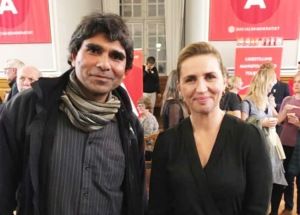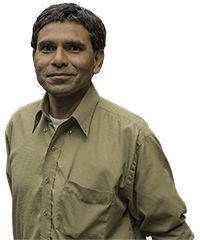Opinion
Mishra’s Mishmash: Mette Frederiksen’s trip to India illustrates that Denmark still punches above its weight
Mrutyuanjai Mishra
This article is more than 4 years old.

Mishra meets Mette
It was US President Barack Obama who a decade ago used a metaphor from boxing to explain Denmark’s role in the world, stating that it punches above its weight. He admires the efforts made by Nordic countries in contributing to international aid and taking measures to mitigate Climate Change.
And now 10 years later, COP26, the UN Climate Change Conference, is scheduled to be held in Glasgow between October 31 and November 12 under the co-presidency of the UK and Italy.
Within a span of a few days, most world leaders will gather – especially in the second week of the conference – to finalise a document that many hope will include concrete measures to effectively fight climate change.
Skill meets scale
Danish PM Mette Frederiksen has attracted the world’s attention by involving India in a major green strategic partnership. On her trip to India earlier this month, she was received with the highest state protocols.
“The prime ministers of both countries noted that if Denmark’s skill and India’s scale are combined with scope, speed and sustainability, it can be a good example for others to emulate,” India informed the world media.
India surely has the scale. There are more schools in India than there are pupils in the Danish school system, and 51 percent of the students are female.
Enthused by India
I had the opportunity to personally meet the Danish PM after her trip and was delighted to note her tremendous interest in Indian society at large. She visited a school on her trip and recalled with enthusiasm her interaction with the students – especially the female ones.
Less receptive were the media at various press conferences. Some of the tough questions she fielded were unfounded, and it is a pity that Danish journalists have jumped on the bandwagon of criticising her for wanting to forge a green partnership with India, where the benefits would largely be realised by Danish green industries.
They have also criticised Frederiksen for not offering India COVID-19 vaccinations, which doesn’t make sense given that India is the largest vaccine-producing country in the world – Bill Gates recently wrote a column in the Times of India applauding its landmark achievement of administering one billion jabs to its citizens (a further 60 million have been exported) – and that Denmark does not produce any vaccines.
Furthermore, thanks to its well-tuned pharmaceutical industry, India is able to offer vaccines to poor countries at an affordable price.
The new China
Denmark is a leader in green technology, and it is in this arena that Danish companies will probably move some production units to India. But it is wrong to designate Denmark as a country with abundant skills. Danish industry desperately needs engineers, and guess where they are getting a large proportion of their skilled labour from!
The Danish industrial sector has wisely formed joint forums with its Indian counterpart to develop talent. Furthermore, the sector has started working with universities and research centres to increase collaboration with India in the field of science and technology.
The US invested heavily in the Indian education system, and Denmark is similarly taking steps in this direction. As the winds of a new Cold War blow between the US and China, Denmark is acting strategically to move some of its production units from China to India – and some all the way back home.
Frederiksen has struck a chord and, almost seven decades after India’s independence, India has found a true friend in the Danish PM.

About
Mrutyuanjai Mishra
As a regular contributor to the Times of India, the country’s largest newspaper, Mishra is often sought-after by Danish media and academia to provide expertise on Asian-related matters, human rights issues and democratisation. He has spent half his life in India and the other half in Denmark and Sweden.










































